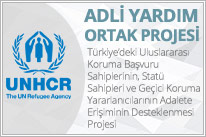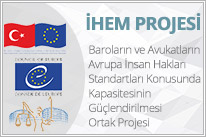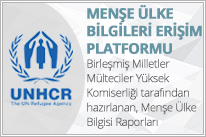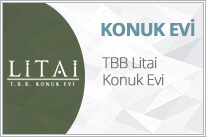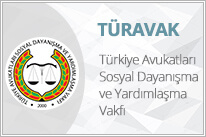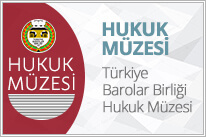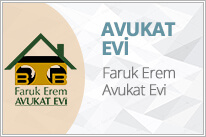Opening Speech
OPENING SPEECH OF THE PRESIDENT OF THE UNION OF TURKISH BAR ASSOCIATIONS PROFESSOR DOCTOR METIN FEYZIOGLU ON OCCASION OF THE BEGINNING OF 2013-2014 JUDICIAL YEAR
Mr. President,A while ago, we have reached the 44th anniversary of the establishment of the Union of Turkish Bar Associations, which was established on August 9, 1969.
I can not say "we celebrated", but "reached"; because we are in an environment, in which it has become obligatory "to defend the defence" now.
We are in an environment where the principles, which the contemporary law has adopted in terms of attorneys, such as:- To be able to perform any kind of professional activity without encountering with any pressure, hindrance, harassment or unlawful interference,
- To be protected, in the event that their security is threatened, while they are performing their duties,
- To benefit from civil and criminal immunities with regard to their written and verbal requests before the places of jurisdiction and administrative authorities,
- And confidentiality of their communications with their clients, are violated.
Today, the defence is under pressure. Attorneys are being investigated and prosecuted because of their professional activities. They are being manhandled out of the courthouses and courtrooms, and being prohibited from performing their duty.
Mr. President,
Assurances offered to the attorneys, while they are performing their profession, are in no circumstances personal privileges. That is to say, rights that are written in capital letters in international legal texts, constitutions or laws do not mean anything, until they are made available for the people. It is the duty of an attorney, to make these very rights available for people. In this case, attorneys are the members of a profession, which turns the human, living in a society, into an individual. Every attack intended for the rights and powers of, or directly intended for the life or physical integrity of the attorneys, is in fact intended for the individuals. Therefore, in a place, where attorneys are manhandled; it is actually the citizens, who are manhandled.
Bar associations and their umbrella organization, the Union of Turkish Bar Associations, are the organized powers of the attorneys. Hence, the reason of assigning the duty of "defending and safeguarding the supremacy of law and human rights, and promoting the functionality of these concepts" to the bar associations and the Union of Turkish Bar Associations pursuant to Articles 76 and 110 of the Attorneyship Law, is the indispensable place and importance of the attorneys in the society.
In every state, regardless of the regime, institutions whose duty is to judge the disputes have been established, and the officials have been appointed throughout the history.
In other words, there have been courts, established for the purpose of resolving the disputes in every state; either it is a totalitarian, an authoritarian or a democratic state. However, an independent defence, which is efficient and constitutes the basis of jurisdiction, may only be mentioned in democratic states of law.
In the democratic states of law, duty of the courts is to investigate the accuracy of the claim and to distinguish the right from wrong and guilty from innocent by using judicial means. Judicial means indicates the means determined by the rules of law, which are in compliance with the universal criteria. At this point, we come across with the right to a fair trial. The aim of the contemporary criminal procedure is to try to find the truth by not tarnishing people, not oppressing the society, by reinforcing every individual's right to legal security, and in a way not to cause the ones, who exercise their democratic rights and freedoms, fear, even worry.
Therefore, if one starts out saying that "we will find the truth, no matter what" and ignores the judicial means and right to a fair trial included in it, the truth cannot be found and moreover, the investigation and prosecution process violates the public order more than the offence being investigated or prosecuted. In every case, when the judicial means are not followed and the right to a fair trial is violated, not only the individuals investigated or prosecuted, but also third persons start to worry about their fundamental rights and freedoms, and their legal security as well.
It should not be forgotten that, a person may guarantee that she/he will not commit to an offence all her/his life, and she/he can be remain true to her/his word. Yet, no one may know, whether she/he will be tried one day, or not. For this very reason, the rules of contemporary criminal procedure protect the suspect and defendant on one hand until he is proven guilty with a final judgement on the basis of the fundamental right to the presumption of innocence, and all other individuals in the society, who knows that they may be accused or tried one day, on the other hand.
In the societies, where the right to a fair trial is not internalized by the legal practitioners, and is therefore often violated, the individuals live by fearing from the fact that the state may violate their fundamental rights and freedoms any time; they start to abstain from expressing themselves, and they perceive the state apparatus as a big brother that they fear, rather than a service instrument.
Mr. President,
In the current situation of proceeding law in contemporary democratic law/state/society orders, it is accepted that the "truth" can be found with the help of collision of arguments. For this, three equal authorities are needed:
- A judicial authority including the courts and judges,
- A prosecution, which is organized entirely outside of the judicial authority,
- And a defence, comprising of attorneys who are completely independent from the judicial authority, prosecution and the political power.
All these aforementioned authorities are the constituent elements of the jurisdiction.
As long as the courts and judges are not independent and impartial, we cannot mention fair trial and therefore we cannot suggest that the jurisdiction dispenses justice.
On the other hand, if the judges and prosecutors get closer to each other and become distant to the defence, then the indispensable principle for reaching the truth in proceedings, i.e. "no one can be the judge in his own case" will be violated. Because, even if the prosecuting and judging authorities seem separate from each other, de facto convergences and even alliances will result in the situation in which the prosecution prosecutes and delivers the judgments at the same time.
In addition to the fact that it is very important for the judges to be impartial and independent, it cannot be accepted that they put themselves in the place of legislators or administrative authorities and behave like the government. To be more precise, there should be no separate states within a state; and classification of the judiciary members by some of the bodies within or outside of the government as "my judge" or "your judge" can under no circumstances be accounted for. If such debates are going on in a country, it means that nobody has legal security there. And if the justice is the foundation of the state, then the state will lose its foundation.
An indispensable condition of the right to a fair trial is the presence of an independent and efficient "defence" which therefore is the constituent element of the judiciary. In the event that the defence is weakened against two other authorities and other two authorities do not fully understand and internalize the indispensable function of defence in ensuring justice, an effective antithesis cannot be suggested in reply to the thesis put forward by the prosecution. In this case, the trial cannot be expected to reach the truth and justice.
In the end, guilty from innocent and true from false cannot be distinguished. And the obtained result will not be the "truth", but a deception consisting of the result, which the courts themselves or the powers affecting the courts want to show instead of the truth.
We have to confirm that, the High Council of Judges and Prosecutors cannot provide independence for the judges and assurances for judges and prosecutors in our country. On the other hand, despite the reforms which are said to be made, the problem of fair trial has not yet been profoundly examined, and maybe it was not even intended to do so. I regret to note that, as a consequence of the fact that the judges and prosecutors perform their apprenticeships in the same place, their personnel affairs are under the responsibility of the same authority, they stay in the same lodgings, arbitrarily enter in the places assigned for the attorneys through the private doors in the courts and take the private elevators, sit in the neighbouring rooms and it is easy to change between these two professions, they regard themselves close to each other, and even the same in deed; and they refuse to accept the attorneys as a constituent element. Therefore, in a place where the attorneys are not regarded as a constituent element of judiciary, it is impossible to say that the right to a fair trial is being implemented.
Unfortunately, even if the sacredness of the defence is always talked about, from our point of view, the fact that it is still not accepted as a constituent element is an obstacle against reaching the truth.
We cannot understand and criticise the justification of the motion for stay of execution No. 2012/5257 of 05.11.2012 adopted by the Council of State Sixth Chamber which ignores the public service element belonging to the attorneyship and regards attorneyship as just a professional occupation, in spite of the clear provision in the Law.
I demand, on behalf of the 80 thousand attorneys, the illegal administrative action of the Supreme Court Board of Presidents, which made it obligatory for the attorneys to submit a power of attorney in order to review lawsuit and legal action files in the Supreme Court, despite the open provision in Article 46/2 of the Attorneyship Law to be withdrawn. Even the reports that we have submitted to the Supreme Court in this respect, prepared by many legal academics from different universities and clearly revealing the illegality of the decision in question have not been taken into consideration. The justification for the rejection of our objection has not been communicated to us. I regret to express before all of you that, this implementation is of a nature which pushes the limits of respect, underestimates the attorneys and bar associations and prevent collaboration; and I want to report the Supreme Court to the Most Noble Supreme Court. I know very well that, the Judges, who took this decision, will understand the gravity of this decision, when they will be working as attorneys and they have to submit power of attorney in order to learn the content of the cases, which are not familiar to them, for deciding whether or not to take the case. I hope that the Supreme Court will correct this illegality, before this situation happens.
Mr. President,
Our area of profession is constantly being restricted, and the number of the activities to be performed only by the attorneys is gradually decreased. Attorneys still lack an efficient social security. Law school graduates who have not received adequate training in the law schools, which were opened in an unregulated manner, can start their apprenticeship somehow and easily become attorneys, as a consequence of this, the quality of service decreases and the attorneys are heading towards major economic challenges. As the Union of Turkish Bar Associations, we are always ready to do our part in these regards. Within this framework, our studies for making regulations for increasing the quality in attorneyship apprenticeships and for the introduction of the efficient evaluation methods have come to the final stage. On this occasion, we would like to call the Board of Higher Education for collaboration, in terms of opening of law schools and determining their curricula.
I would like to express that we welcomed the fact that attorneys and bar associations have been included in the jurisdiction section of the Reconciliation Commission's studies concerning constitutional amendments. However, we condemn the intention to offer foreign attorney partnerships Constitutional assurances in the strongest sense, which is to highly damage the profession of attorneyship in Turkey, to directly affect 800 thousand people including the relatives of the attorneys, and to make impossible for millions of our citizens to benefit from attorneyship services due to lack of economic opportunities.
The applicable Attorneyship Law can from many aspects be described as anti-democratic, controlling, and far from meeting the needs required by our age in terms of our profession. As the Union of Turkish Bar Associations, we are ready for preparing a contemporary draft law, which will satisfy many segments, with the contribution of all bar associations and attorneyships. I would like to remind all of you that, it goes without saying that amending the Attorneyship Law with the draft laws to be suggested to us with the mentality such as "I made the best" without a participatory process or with the proposals made in the middle of the night will heavily damage the state of law and the peaceful social life.
Within the scope of the new Attorneyship Law, acceptance to the apprenticeship and profession should take place through an exam; and the occupational field of attorneyship should be planned again according to the needs of modern people, by modelling on the legislations of the developed countries.
Tutelage of the administration on the bar associations and the Union of the Turkish Bar Associations should completely be removed, a support pool similar to the notaries' should be created, considering the fact that attorneyship is a civil service, right to have a green passport should be offered to the attorneys over a certain degree, efficient sanctions should be imposed, in cases where the requests of an attorney on the basis of the authority to gather evidence are not fulfilled, it should be fully comprehended that attorneys are the constituent element of the judiciary, and the Law of Attorneyship should be rewritten in a way to offer assurances against judicial actions which deny to accept the raison d'être of the attorneys, bar associations and the Union of Turkish Bar Associations.
At this point, I take it as my duty to express that solutions should now be found for many problems of the courthouse personnel, who cannot have the opportunity to express themselves here. In this context, I would like to inform you that there are lots of problems waiting for a solution in this regard, starting from serious health problems of the courthouse workers caused by using computer for hours and negative working conditions and including the fact that personnel within the framework of 4/c are not employed as permanent staff.
Mr. President,
In your high presence, I would like to submit some of my observations and evaluations in terms of the democratic, secular and social state of law, which we are liable to safeguard pursuant to the clear provisions of the Law.
State of law is a state which has respect for the human rights and establishes a legal order for safeguarding these rights, and considers that it is imperative for it to maintain this situation; and complies with the law and the constitution with regard to its activities. This definition stipulates the presence of free human beings and citizens granted with rights and obligations. In a democratic state of law, what dominates is not the law of superiors, but the supremacy of law.
On this occasion, I find it necessary to briefly evaluate the expression "national will", which is mostly pronounced recently. When we look at the history of the world and Turkey, we see that the saying 'national will' have been preferred by the political powers which have been elected for duty but adopted majoritarianism instead of pluralism and have gradually begun to show authoritarian tendencies. However, contemporary democracies are pluralistic. In other words, contemporary democracies embrace not only the political views of the majority of that time, but also other views belonging to the minorities. If the expression 'national will' is necessarily desired to be used, it should not be forgotten that, the Republic of Turkey is based on a majoritarian democracy model. In this case, national will have to be understood in a different way from its meaning in the periods, when the majority dominates minority, political powers take hold of every institution, try to regulate every aspect of life and intervene in the lifestyle of the people.
Therefore, the ones who want to continue to use the term "national will" in a contemporary democracy should always remember that opposing ideas to the political power are also involved in this term, governments cannot do whatever they want trusting their majority in the parliament and they are also the government which also has to serve for the people who did not vote for them; and it is obligatory to act in compliance with the general principles of the law representing common values of the humanity, duly adopted international conventions concerning the human rights and the constitution. In addition, it should always be kept in mind that basic characteristics of the Republic, expressed in the immutable articles of our Constitution, do restrict the political power and prevent the majority from dominating minorities. Contrary to some people propose so, what is meant within the framework of these restrictions are in no circumstances domination of the majority by the minority; what is meant is the culture of democratic reconciliation, it is the participatory democracy, and preventing a contemporary majority from dominating over a contemporary minority by trying to impose a certain kind of school type, a certain belief and moral code on the people.
One of the greatest enemies of a democratic state of law, therefore a modern society, is no doubt the military coups. It has been proven with the examples from Turkey and other countries that the military coups destroy the democracy culture, can never be a remedy for any problems and create new and bigger social problems. All military coups, without an exception, have prevented the institutionalization of political parties, which are indispensable for the democracy, have not allowed non-governmental organizations, restrained the democracy from becoming a lifestyle and created a democracy culture which lacks adequate profoundness and in which people only vote from election to election.
The most recent example showing how great disasters military coups may cause is being experienced in Egypt, on which case Turkey has expressed its justified reaction. For this response to be effective on world public opinion, it goes without saying that human rights and democratic freedoms should be respected at maximum level in our own country.
Using violence against the people exercising their right of peaceful assembly, killing or injuring the demonstrators with real bullets, using tear gas bombs, plastic bullets or water cannons including chemical substances by targeting directly on the people is a felony, either in our country or in other places in the world. And the ones who commit these offences should not be encouraged or awarded, but must be punished. No political or economic interests are more precious than the human life, which is the most superior of all. There is no excuse for slaughtering people in Sudan, in Latakia, in Rojava, in Adeviyye of Egypt or in Tahrir, Lice, Uludere, Reyhanlı, Akcakale, Ceylanpınar, or in the streets of Eskisehir, Ankara, Istanbul and Hatay.
In a democratic state, the state paves the way for thinking and expression, makes the social communication channels available in order to enable the thoughts not calling for violence can be conveyed, and does not prevents peaceful assemblies and demonstrations. The freedom of expression and peaceful assemblies and demonstrations for exercising it, are the most important evidence of the existence of a free and democratic society.
"Ballot boxes" are of course indispensable for the democracies. But democracy is not a regime limited to voting in the elections, but a life style. In a democratic state of law, a political power is well aware that it is subject to the legal rules, no matter how broad its majority in the parliament. And the practitioners of the rules of law always look through a libertarian point of view. Because in a democratic state of law, the freedoms are the basis and restriction of the freedoms are only exceptions.
When the freedoms are at stake, the state is obliged to remove barriers, instead of restricting and prohibiting them.
Within this framework, no one may be subject to administrative or criminal investigations, because of the fact that he expressed his thoughts. According to the Constitution, the European Convention of Human Rights and the decisions of the European Court of Human Rights, state security forces cannot interfere in the peaceful demonstrations by using force in any way. Having warned the demonstrators to "leave" cannot be an excuse for using force against those who are not leaving. Arbitrarily and actually punishing the person exposed to force, after using excessive force in cases where the use of force is justifiable, and after she or he is neutralized no doubt requires a responsibility. And again it goes without saying that massacres and violence actions performed by the people with sticks or paddles on their hands with the support of the police officers on the streets and even in the daylight constitute a heavy offence.
What distinguishes the state security forces from the illegal armed forces is the fact that the security forces’ the authority to use the force is regulated under very strict rules. A police officer who is acting by ignoring these rules is no different than an ordinary armed criminal; he only has a much bigger responsibility, since he has abused the guns and authorities granted by the state. When the security forces members abusing their powers are protected, reputation of the security forces, which should normally be sympathized in the society, is damaged; wall of hatred starts to rise between the law enforcement officers and the people, and thousands of law enforcement officers, who are performing their duty devotedly in compliance with the law, are subject to the accusations undeservingly in the society.
Mr. President,
It is not the state, which is sacred according to the concept of contemporary state, but the people, whom the state is obliged to serve. Those who want to sanctify the state want to sanctify themselves and to declare themselves as untouchable in reality. And the ones who embrace this point of view regard their service to the people not as a duty, but a blessing. Those who deceive themselves as if they grace the people by serving them, get angry when the individuals express their opposing ideas and the crowds gather and make demonstrations and they accuse the people of rejecting to understand their value.
Of course, political powers do not have to be pleased with the criticisms of democratic mass organizations, nevertheless, they have to take these criticisms into account and tolerate them in the pluralistic democracies. In the pluralistic democracies, the political powers do not target the political ideas that they do not like and try to eliminate democratic mass organizations by relying on their majority in the parliament; they rather accept them as an indispensable element of the democracy and they live in harmony with them. Therefore, they do not destroy what puts them into power, namely the democracy, by themselves.
In fact, the pluralistic democracy is the only model of democracy. Even if the majoritarian regimes declare themselves as democracy, there are no freedoms in these orders; there are blessings of the political power.
Freedom of thought, freedom of expression and freedom of the press are indispensible in a democratic state of law. The greatest threat to the freedom of press is not only the lawsuits filed against journalists or administrative-financial implementations aimed at newspaper owners and self-censor, which the newspapers have to perform, but also monopolization and the restrictions imposed on organization of press workers. When these freedoms are restricted, the opportunity of opposing parties and democratic mass organizations to oppose in an efficient way is taken away from them. In this case, no matter how much they are oppressed, the society explodes at some point and the social opposition gets ahead of political opposition. In case of social events, political powers need to try to find the real reasons for these events and to understand the problem of the society, instead of defending themselves by accusing the others. It is easy to blame the others, and it is hard to find a solution. However, democracy requires the achievement of difficult tasks. And the key to this achievement lies in tolerance, reconciliation and common sense.
Mr. President,
Special Heavy Penal Courts and Anti-Terrorism Courts are the extraordinary courts of the ordinary periods. Just as the explanations indicating that the State Security Courts, which had to be abolished in the end, due to the fact that they were anti-democratic, are the specialized courts and the statements made by Turkey in the European Court of Human Rights in this respect were not found convincing, the arguments indicating that the Special Heavy Penal Courts and Anti-Terrorism Courts are specialized courts are not convincing according to the objective criteria. Unfortunately, just like repeating the bad old habits, it was decided with the Constitutional Court Decision No. 2012/100 E., 2013/84 K. of 04.07.2013 that Anti-Terrorism Courts are specialized courts and these courts have been given an opportunity to be constitutionalized, even if they do not have a constitutional basis.
As you all are well aware, Special Heavy Penal Courts have been abolished by the Grand National Assembly of Turkey, because of their anti-democratic implementations. However, these courts were allowed to operate until they have concluded the cases they have, in a way that cannot be explained in terms of the logic of law. The Constitutional Court justified this with the principle of the natural judge and did not find it unconstitutional. It is only natural that a medicine which is determined to be harmful to the human health and decided to be recalled from the market cannot be allowed to be sold until the stocks in the pharmacies end. Similarly, Special Heavy Penal Courts, which are determined as not belonging to a democratic state of law, being found anti-democratic by the legislative organ itself, should not have been allowed to continue judging and therefore violating the rights of the defendants. With this decision of the Constitutional Court the definition and function of the principle of the natural judge has been heavily damaged.
Also, it is not possible to understand that after the legal regulation enabling detention up to 10 years was cancelled pursuant to the aforementioned Constitutional Court Decision, enforcement of this cancellation decision has been postponed to one year later as of the date it is published in the Official Gazette and the fact that this implementation is justified by suggesting that the public order will be violated, in the event that the cancellation decision would be enforced immediately. However, the cancellation decision has not removed the practice of detention; it has just cancelled the one of the maximum periods of detention, namely the 10 years period. This cancellation in fact eliminates a defect. It is clear that when the defect in question is removed, another maximum period of 5 years will be implemented. Therefore, the cancellation decision will not create a gap. Since it was suggested in the reasoned decision of the Constitutional Court that the immediate implementation will cause violation of the public order, it was perceived as an instruction by the courts and the obligation to immediately implement the cancellation decision concerning fundamental right and freedoms was ignored by departing from the usual practice.
Mr. President,
Especially in the last few years, amendments made under the title of "judicial reform" have been tried to be adopted through "bag bills" contrary to the legislation technique. Bag bill method prevents the public and the relevant democratic mass organizations from following the enactment process; it is far from being systematic and based on trial-and-error approach.
The facts that most of the basic aspects are being regulated through the law proposals, which are not adequately examined, or the last minute motions for amendment submitted to the Plenary Meeting of the Grand National Assembly constitute a big problem in terms of the participatory and pluralistic democracy.
Similarly, continuously attacking to the legislative field with the help of Statutory Decrees does not only eliminate the Grand National Assembly of Turkey, but also by disabling the opposition, which is indispensable for the democracy, it prevents the public from being aware of the regulations beforehand, participating in the process and expressing their reactions via democratic means.
Mr. President,
A process, called as a peace process or an opening process, has been brought forward. Of course, we do not want any of our citizens to get hurt, not even a little. Our greatest wish is to make the bloodshed end, to soothe the pain and make the brothers and sisters embrace each other. However, we do not have the reliable information with regard to how does the process progress, with whom and how are the negotiations done, what are the stops in the roadmap and what is the ultimate goal of this process. Since the aim is to cease the bloodshed and providing social comfort, we should meticulously abstain from triggering a civil war, which will be a great disaster for all of us, by reaching a common sense. Therefore, it is compulsory for the process to be managed in a transparent way and a broad-based consensus to be reached.
It is not possible to reach a common sense without repairing the social conscience which was damaged by the lawsuits called as Sledgehammer Case, Ergenekon Case, Espionage Case and KCK Case, in which the right to a fair trial has been violated and which have all lost their credibility with the help of the analysis also made by the international institutions.
Just as the trauma of Yassiada cases is still present and implementations of Yassıada Court, which completely ignored the law, are black marks in the Turkish Legal History, each of these aforementioned cases are also black marks that will be left for the future from today.
The Kurdish question is essentially the problem of democracy, freedoms and human rights. Permanent solution may only be provided by offering equal citizenship status not only in the constitution but also in practice, by preventing discrimination and abstaining from all kinds of discrimination likely to lead to other discriminations. Our duty is to give the same resolute reaction that we give in case of a violation of a human right in Ankara, in Istanbul, in Izmir, also in Sirnak, in Diyarbakir, in Lice and in Uludere.
A comprehensive study has been carried out for a while in the Grand National Assembly of Turkey to amend the constitution. The purpose of constitutional amendments should be to have a more democratic, freer social and state order in which the supremacy of law prevails. And there are lots of other steps to take, which are simpler than the constitutional amendments, in order to reach this purpose. For example, removal of anonymous witnesses, the practice that reminds us inquisition period, abandoning the regulation concerning catalogue offences, which in practice create a perception as if detention is compulsory, abolishment of the Anti-Terrorism Courts, repeal of the Anti-Terrorism Law, removing every obstacles before freedom of thought, freedom of expression, freedom of press and freedom of assembly and demonstration, preventing monopolisation in the press, enabling the press members to be organized, abolishing Board of Higher Education, making the universities administratively and financially autonomous and allowing them to be free in practicing science, decreasing the election threshold of 10 % are some of the few which will clear the way. A platform in which everybody will express their thoughts without hesitation and easily find the channels to share these thoughts with the public cannot be created, unless these steps are taken. A democratic constitution can be created with the broadest participation.
I have to express here as required by our historical responsibility that the "Turkish style presidential system" which has been brought to the agenda during the constitutional amendment discussions and which is cleared of the indispensable condition for the presidency system to have a democratic characteristics, namely checks and balances mechanisms, does not aim at being a presidential system, but an authoritarian organization based on the principle of unity of power.
Last but not least, I would like to share our opinions on secularism and Atatürk's Nationalism constituting the ground of our Republic and guaranteed in the Constitution.
Today, both Turkey and the Middle East are on two very deep fault lines, being "religious and sectarian discrimination" and "racism". We have to be against all kinds of religious and sectarian discrimination and racism for brotherhood and sisterhood, peace, comfort and a secure future. We must regard the differences not as a reason for disintegration, but as a means for enrichment. We should put the common interests forward, rather than the disputes.
A secularist approach which rejects religious hostility, but also does not accept dominance of one sect on another and which believes that sovereignty is not something divine, but it belongs to humanity, therefore the nation, is a prerequisite for the democracies, freedoms, and a free and secure living.
And Atatürk's Nationalism, which accepts every individual living in the society as equal citizens regardless of their races, religions, sects, beliefs and political orientations, is the one and only foundation against segmentation, disintegration, and vanishing.
If the lessons are learned from the history, then the history will not repeat itself. Having multi-legal systems and being distant from scientific thinking in every field caused the Ottoman Empire to collapse. The one and only true guiding light for the Republic of Turkey which was born from the ashes of the Ottoman Period with the miracle named the Great Leader Mustafa Kemal Atatürk is science.
We have to fully understand secularism and Atatürk's Nationalism in order to build a democratic state of law, which is to be stand still in spite of the fault lines present in our country and region. In addition, we are obliged to not to give up on the "Peace at home, peace in the world" principle and keep away from the adventurous approaches such as "Neo-Ottomanism".
And for the sake of "peace at home"; we must never forget that, all of our citizens are "equal citizens". We must never allow any of our citizens to be subject to discrimination due to her or his ethnic origin, sect, religion, belief, language, gender and colour. Similarly, we must not divide our citizens into different groups such as "mine - yours" or percentages owing to their political ideas. We must stand up together to the implementations carried out by some of the state institutions and organizations that will breed bad blood among the citizens by creating a perception of oppression for some citizens due to their political views and granting privileges for some others.
We must know the starting lines of Turkey's journey for democratization very well. For example, we must not imitate anti-democratic regulations of the past such as extending the detention periods and granting authorization to take into custody to the police, we should search for solution always in the democracy. We must stay away from any kind of declaration, implementation and regulation likely to be associated with a police state. We must not make the calls to make some citizens report each other, to make the neighbours to spy on each other. We must cease to develop projects specific to authoritarian and totalitarian regimes that will destroy social solidarity and promote whistleblowing, such as "confidential police points".
We must protect the science, arts, free thinking platforms, and the universal criteria for human rights both at home and in the world. In this way, we have to make the Republic of Turkey the leader country of the family of contemporary states. We should not forget that, the fact that Turkey will be attending to the G-20 summit to be held in a few days as one of the most important economies of the world, will not be permanent, unless it reaches to the leadership in terms of free thinking and therefore in sciences and arts, and the wealth will not be shared among its people.
We have to know that, in order to ensure both economic and political stability, democracy, human rights and the supremacy of law should not be compromised. We should always remember that in an order in which the "law of superiors" prevails, stability cannot be mentioned, because everybody's fate will be left for the will of the political power in such order.
If there is tyranny in any part of the world, like in Sudan, Iraq, Syria and Egypt, of course we should truly stand by the oppressed people, and we should not be in pursuit of any kind of political interests, when we protest against oppression. But in doing so, we should be side by side with the world, rather than opposing, in order to be efficient and not to put our Nation into danger, and we must always stay within the framework of the international law. If a state wants to mobilize the states of the world against a tyranny, it should at first have respect for the freedom of thought, freedom of expression, freedom of assembly and demonstration and freedom of press and for all human rights in its own country at maximum level.
Mr. President,
Struggle of the Union of Turkish Bar Association in order to put the notion of "supremacy of law" into practice in favour of the pluralistic democracy, human rights, universal law, freedoms, peace, labour, people and rights in the light of the Republic for 44 years is the honourable past of 80 thousand attorneys and 79 bar associations and they carry their past proudly as a medal. I would like to express it again in your presence that we will continue to be worthy of this honourable past; and to the members of the judiciary: to attorneys, judges and prosecutors; to the faithful courthouse personnel and to every individual in our Nation who are waiting for fair trials from the judiciary that decides on behalf of them, I would like to wish a happy, healthy, successful and a FAIR Judicial Year without any concerns regarding the future, and with legal assurances.
Yours respectfully,
Attorney at Law, Prof. Dr. Metin FEYZİOĞLU
President of the Union of Turkish Bar Associations




